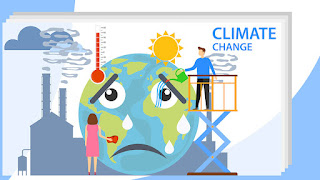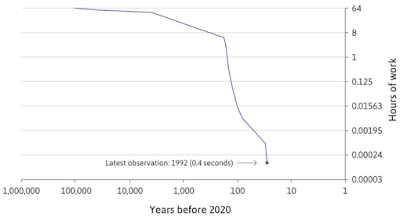by Thomas R. Wells
 Climate change is a huge and urgent problem. It is natural to suppose that it is therefore a terrible mistake, an unforced error that we should regret and try to prevent ever happening again.
Climate change is a huge and urgent problem. It is natural to suppose that it is therefore a terrible mistake, an unforced error that we should regret and try to prevent ever happening again.
I disagree. Climate change is the unfortunate outcome of the economic growth that has transformed human civilisation for the better. We cannot regret climate change without regretting the vastly better world for most people that the fossil-fuel powered industrial revolution brought. Nor should we draw the anti-technology lesson that solutions are always worse than the original problems, that humans should retreat to living within the bounds of nature rather than attempting to escape them.
The argument I am trying to oppose is not often made explicitly, but seems to lurk around and underneath the response to climate change, especially among people younger than me. It looks something like this:
P1. Climate change is a huge and urgent problem
P2. Climate change is human-made, the result of the industrial revolution and the striving for economic growth
C1. Therefore, climate change is the result of bad choices based on bad values that we should regret. (This often takes the form of a quasi-religious sense of ‘original sin’ among the climate woke)
C2. Therefore, we should prevent such mistakes from happening again (This further anti-technology/anti-growth conclusion is not drawn by everyone, but is powerful within the environmentalist movement)
Let me take each conclusion in turn.
1. We Should Not Regret the Choices that Led to Climate Change
Capitalism has achieved an extraordinary transformation of the world in only two hundred years. Extreme poverty has flipped from 90% of the world’s population to less than 10%, and this has been accompanied by an (incomplete) revolution in freedoms, rights, health, literacy and so on. This world is far from perfect, but extraordinarily better for humans than at any other time in history.
Capitalism is basically what follows from having an open society in which people can organise themselves to achieve their own projects, more or less independently of the organisation that runs the state (Douglass North). One part of capitalism’s economic success is that it frees the allocation of resources from the grip of the political elite. Instead of going to the purposes most convenient for the members and affiliates of the ruling coalition, land, labour and capital are allocated via markets to wherever they can earn the highest return, i.e. wherever the economic value they can create is highest. More efficient allocation of a society’s resources raises its productivity: the amount of economic goods it can produce and hence consume.
This is the first way that capitalism makes a society richer. However, there are limits to what can be gained merely by rearranging resources from less to more productive uses, even if you globalise the model. In the long run, this source of economic growth runs out; the economy would have stopped growing while most people were still poor.
So the second way that capitalism makes societies richer is essential: technological development. It turns out that the same open competitive structure that drives economic actors pursuing their own profit to allocate resources to their most efficient uses (Hayek) also drives them to look for technological ways to get more from those resources. Global capitalism should be understood as a giant machine learning algorithm for finding new ways to meet our needs with less human effort and scarce resources. The result has been 200 years of ever increasing prosperity.
To recycle an example I have used before, consider the evolution of the cost of lighting over human history, from firewood to tallow candles to oil lamps, gas lamps, incandescent bulbs (where the graph ends) and now super-efficient LEDs. Where once it might have taken over 60 hours to gather the wood to burn to provide 1,000 lumens of low quality flickering light, now we can turn night into day at the flick of a switch for a fraction of a second of our labour, and with a fraction of the resources previously needed and their environmental impact.
The key technological revolution with respect to climate change is the one that powered the industrial revolution. Capitalists discovered, refined, and systematically exploited the ability to convert fossil fuels into work, allowing them to add vast amounts of human/animal labour equivalents to the economy. As we all know, it has since turned out that this cheap energy had a higher price than was thought, in the form of a warming world and all the disruptions to climate and ecosystems that follow.
It is true that the fossil fuel powered industrial revolution caused climate change and that climate change is a terrible problem. But I disagree that it follows that we should regret the industrial revolution in the sense of wishing that it had never happened. The industrial revolution was an objectively good thing overall, because, although it created a terrible problem, it also helped humanity out of a worse one. The price was worth paying even though it turned out to be higher than expected.
To put this another way, it would be irrational to prefer the counterfactual situation of a world where the industrial revolution never happened i.e. a world without the challenge of climate change but where we were still trying to get everything done with donkeys and windmills. By this I mean that if the people living in that alternative world heard about the possibility of an industrial revolution plus climate change, it is they who would regret the path not taken; it is they who would wish to swap places with us.
Note, I am not arguing that climate change itself is a good thing, or that it does not deserve our governments’ full attention. I also acknowledge that there is a great deal to regret about the world’s flailing response to the challenge of climate change since it was brought to governments’ and public attention in the 1980s. The delay in effective action has dramatically increased the costs and risks imposed by climate change as well as the costs of keeping it from reaching catastrophic levels. Those were real mistakes worthy of regret (and passing some blame about), but the industrial revolution itself was not a mistake. It was a huge achievement by and for humanity that we should be proud of.
2. Humanity Should Not Retreat into the Precautionary Principle
Environmentalists raise many good criticisms of the rosy view of technology powered economic development by alerting us to hidden costs and risks. This can be very helpful. For example, sometimes those costs are so great that the technology turns out to be a negative cost on society and should be given up, like Bitcoin or DDT (usually this is because their business models were based on market prices that don’t adequately incorporate costs on 3rd parties). Sometimes learning about these costs allows us to take alternative technological paths so that we can still achieve the benefits but with smaller costs.
However, many environmentalists don’t seem to think of their contributions in this quantitative way, but in a more ‘gotcha’ sense of discovering some reason why the technology or practice is wrong and therefore ought to be given up. It is this gotcha sense that I see growing increasingly influential amidst the world’s inadequate response to the climate change challenge. It is worrying because it fuels neophobia and political conservatism. The logic goes something like this:
P1. Technology x is supposed to solve problem(s) y [For example, cars provide mass mobility and reduce reliance on expensive, poopy horses]
P2. However, technology x causes problem(s) z [Cars cause accidents/global warming/urban sprawl]
C. Therefore, technology x is bad and should be uninvented
The key error here is not in the identification of the problems, but in the failure to compare – quantitatively – those problems with the benefits of overcoming the original problems that made the technology attractive in the first place. It is a form of cost benefit analysis that only considers costs. That means that if we allow its analysis to guide our actions we will often be advancing backwards into the far worse problems we developed those technologies to escape.
Of course, all technologies create new problems, so this argument can be (and increasingly is) generalised to the conclusion that all attempts to solve problems necessarily make things worse, requiring more solutions that make things worse still, and so on in an endless chain of self-inflicted harm (like the Old Lady Who Swallowed A Fly).
P1. All attempts to solve our problems with technology create new problems
P2. Creating new problems makes things worse
P3. New problems require yet more technological solutions, which create even more problems
C. Therefore, technology always makes things worse and we should stop with it
At the extreme, this supports the back to nature movement, the idea that humans would be better off living as close as possible to what nature ‘intended’. From this perspective, it is dangerous (Promethean) hubris for humans to ever suppose we could have it better. It traps us in a never-ending race to fix our problems before they end us, a race that we will sooner or later lose. We should stop aspiring to more and reconcile ourselves to the kind of life allowed by the bounds of nature.
Naturally I object to this attitude and the underlying arguments. New problems are not necessarily worse problems. They are not an indication that you have made a mistake. They appear as the inevitable result of changing your circumstances (like when you get a new job, start a new relationship, have children, etc). Attempting to live without aspiring to progress, whether as an individual or a society, would be to aspire to dysfunctional paralysis instead.
The ‘technology race’ has served humanity well. The evidence is overwhelming that the world we live in is enormously better for almost everyone than at any time in history. But I don’t think it is yet good enough. For example, I want the rest of the world to be able to enjoy at least my middle-class level of prosperity and freedom, and that alone would require a global economy several times larger than it is now (wonderful analysis by Max Roser). The only way to do that while also keeping climate change within bounds is technology. (And yes, if climate change threatens to get out of bounds then geo-engineering technology might also be needed, despite the new problems it would certainly cause.)
***
Humans have always used technology to address our problems, from the stone-tipped throwing spears that improved our success at hunting to the fires we used to pre-digest our food and ward off night-time predators. The fossil fuel powered industrial revolution allowed the mass of humanity to escape the bounds of Malthusian poverty for the first time. The fact that burning all those fossil fuels also created an enormous new problem of climate change does not mean it was a mistake to be regretted. It doesn’t mean humanity would have been better off without it. It just means we need new solutions involving new technologies (supported by inter-governmental cooperation too of course). Those technological solutions in turn will be imperfect and create new problems, and we will have to address them too. But that doesn’t change the underlying fact that technology works by creating opportunities for human beings to overcome our constraints, and that is fundamentally a good thing.
Thomas Wells teaches philosophy in the Netherlands and blogs at The Philosopher’s Beard


